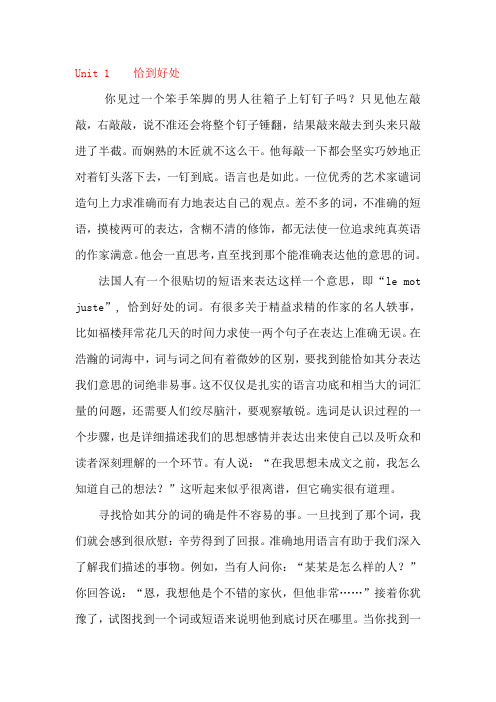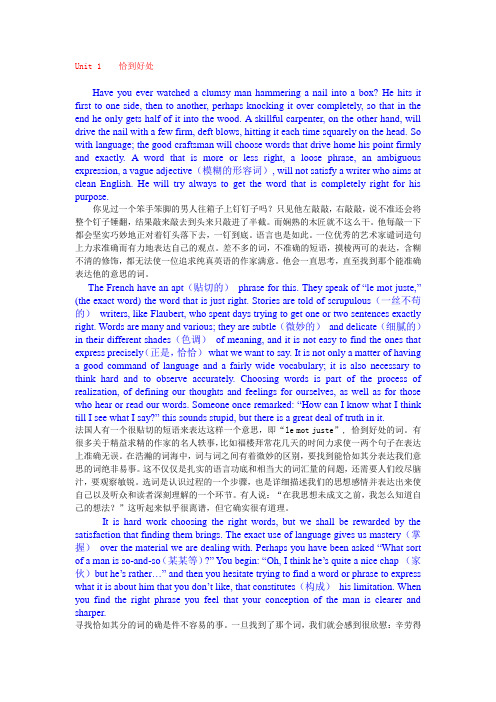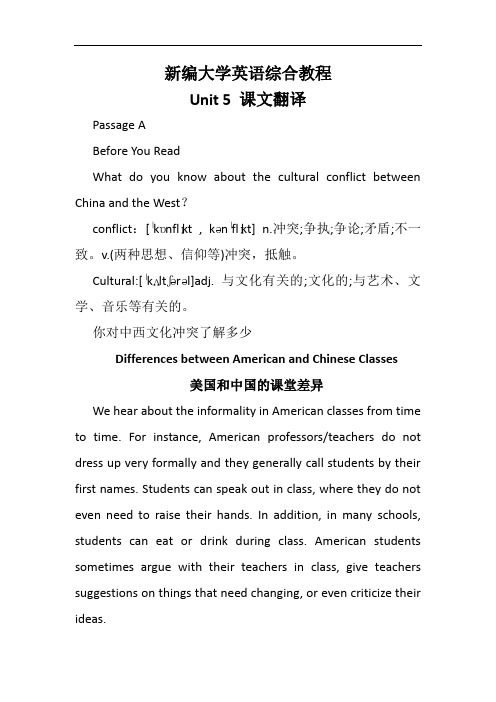新编大学英语5课文翻译
新编英语教程5 课文+翻译(unit1~15)(学生必备)

Unit 1 hit the nail on the head 恰到好处Have you ever watched a clumsy man hammering a nail into a box? He hits it first to one side, then to another, perhaps knocking it over completely, so that in the end he only gets half of it into the wood. A skillful carpenter, on the other hand, will drive the nail with a few firm, deft blows, hitting it each time squarely on the head. So with language; the good craftsman will choose words that drive home his point firmly and exactly. A word that is more or less right, a loose phrase, an ambiguous expression, a vague adjective(模糊的形容词), will not satisfy a writer who aims at clean English. He will try always to get the word that is completely right for his purpose.你见过一个笨手笨脚的男人往箱子上钉钉子吗?只见他左敲敲,右敲敲,说不准还会将整个钉子锤翻,结果敲来敲去到头来只敲进了半截。
而娴熟的木匠就不这么干。
他每敲一下都会坚实巧妙地正对着钉头落下去,一钉到底。
语言也是如此。
新编英语教程5课文翻译(标准)

Unit Three: 我的朋友阿尔伯特.爱因斯坦1)虽然阿尔伯特.爱因斯坦是迄今为止世界上最伟大的科学家之一,但如果要我用一个词来描述他的话我会选择纯朴。
或者有关他的一些轶事能让你理解我为什么这么说。
有一次,遇上了倾盆大雨,他摘下帽子揣在衣服下面。
别人问他为什么,他以令人钦佩的逻辑解释说,雨会淋坏帽子,而他的头发淋湿了却不会坏。
这种直达问题核心的诀窍以及他对美非同寻常的感知就是他主要科学发现的秘密所在。
2)1935年,在坐落于新泽西著名的普林斯顿高级研究院,我第一次见到阿尔伯特.爱因斯坦。
他是第一批被该院邀请的人,在工资方面学院任由他提条件。
令院长惊鄂的是,爱因斯坦要求的薪水简直办不到---- 他要得太少了。
院长不得不恳求他接受一个大一些的数目。
3)我对爱因斯坦很敬畏,犹豫再三才就我一直在考虑的一些想法向他请教。
当我终于鼓起勇气敲响他的门时,听到一个温和的声音说:“进来。
”声调有些上扬,带有欢迎和询问的语气。
我走进他的办公室,看见他坐在桌子旁边,一边抽着烟斗一边算着什么。
他的衣服很不合身,头发乱蓬蓬的,极具个性,向我热情地微笑着表示欢迎我的到来。
他的平易自然立刻让我放松了下来。
4)当我开始阐述自己的见解时,他叫我把方程式写在黑板上,这样他就能明白它们是怎么展开。
接着他提出了一个令人惊鄂但又非常可爱的请求:“请你漫漫地写,我理解东西不快。
”这种话竟出自爱因斯坦之口!他说得很温和,我笑了。
从此残留的畏惧之情都烟消云散了。
5)爱因斯坦于1879年出生在德国的乌尔姆市。
他并非神童式的人物。
事实上他说话很晚,他的父母甚至担心他是弱、智儿。
上学后,虽然老师们看不出他有什么天分,但天才的迹象已经显露。
例如,他自学微积分,老师们有些怕他,因为他总问些他们回答不出的问题。
因此,十六岁时他就问自己是否当人跟着光波跑得一样快的时候它会好像是静止的。
由这一天真的问题的引发,十年之后他创立了相对论。
6)爱因斯坦没有通过苏黎士瑞士联邦工艺学校的入学考试,但在一年后被录取了。
新编英语教程5课文翻译(部分)

Unit 1 恰到好处你见过一个笨手笨脚的男人往箱子上钉钉子吗?只见他左敲敲,右敲敲,说不准还会将整个钉子锤翻,结果敲来敲去到头来只敲进了半截。
而娴熟的木匠就不这么干。
他每敲一下都会坚实巧妙地正对着钉头落下去,一钉到底。
语言也是如此。
一位优秀的艺术家谴词造句上力求准确而有力地表达自己的观点。
差不多的词,不准确的短语,摸棱两可的表达,含糊不清的修饰,都无法使一位追求纯真英语的作家满意。
他会一直思考,直至找到那个能准确表达他的意思的词。
法国人有一个很贴切的短语来表达这样一个意思,即“le m ot juste”, 恰到好处的词。
有很多关于精益求精的作家的名人轶事,比如福楼拜常花几天的时间力求使一两个句子在表达上准确无误。
在浩瀚的词海中,词与词之间有着微妙的区别,要找到能恰如其分表达我们意思的词绝非易事。
这不仅仅是扎实的语言功底和相当大的词汇量的问题,还需要人们绞尽脑汁,要观察敏锐。
选词是认识过程的一个步骤,也是详细描述我们的思想感情并表达出来使自己以及听众和读者深刻理解的一个环节。
有人说:“在我思想未成文之前,我怎么知道自己的想法?”这听起来似乎很离谱,但它确实很有道理。
寻找恰如其分的词的确是件不容易的事。
一旦找到了那个词,我们就会感到很欣慰:辛劳得到了回报。
准确地用语言有助于我们深入了解我们描述的事物。
例如,当有人问你:“某某是怎么样的人?”你回答说:“恩,我想他是个不错的家伙,但他非常……”接着你犹豫了,试图找到一个词或短语来说明他到底讨厌在哪里。
当你找到一个恰当的短语的时候,你发觉自己对他的看法更清楚,也更精确了。
一些英语词汇词根相同而意义却截然不同。
例如human 和humane,二者的词根相同,词义也相关,但用法完全不同。
“ human action (人类行为)”和“humane action ( 人道行为)”完全是两码事。
我们不能说“人道权力宣言”,而是说“人权宣言”。
有一种屠杀工具叫“humane killer ( 麻醉屠宰机),而不是human killer ( 杀人机器)。
Unit-5-Dreams新编大学英语第二版第二册课文翻译.doc

Unit 5 DreamsAre You a Dreamer?1Dreams — why do we have them? Do they mean anything? Is there such a thing as adream in which the events seen by the dreamer come true? Such questions have interested people for thousands of years. Scientific advances in the past few decades have revealed more about the physical process of sleep, but they still don't offer any final answers to the many questions about dreams that continue to puzzle us.2Everyone dreams —it's just that some of us can't remember doing so. Recordings ofhuman brain waves show that we all go into dream mode when we fall asleep. We dreamfor most of the night, but we're only able to remember our dreams if we happen to wake upwhile we are still in REM (Rapid Eye Movement) sleep. This is when we dream. Wehave four or five REM stages of sleep during the night, the first occurring about 90 minutes after we fall asleep. After that, our dreaming periods recur every 90 minutes andlast between 15 to 45 minutes, getting longer as the night progresses.3The main purpose of sleeping (apart from giving us rest) may be to allow us to dream —to review our lives, our worries and hopes in a totally different way, and to get an unconscious view of ourselves, getting rid of material from our memories that we no longer need.4Some dreams may have a simple physiological cause. Dreaming of walking on hotcoals, for example, may well be caused by sleeping with your feet too close to a heater.And the frustrating dream in which you try to run but your legs won't move may be explained by bedding that is too tight. Anyone who sleeps through their alarm may welldream of doorbells or telephones ringing. All are simple examples of how the unconsciousworks with our conscious mind to guide and advise us.5 But such physiological explanations are not enough to tell us why we dream. Somepeople believe that dreams are total nonsense, merely the result of the misfiring of electrical impulses in the brain, while on the other hand, some read great importance intoeven the simplest of dreams.6 Some dreams reflect inner fears that are instantly recognizable. Dreaming of losingyour job or house can reflect real fears, even if they are only subconscious. Most of us have dreamed that we had to take a final exam for a difficult course, which we had nevertaken, or in which we had done poorly.7But what of the dreams that do not have such an obvious meaning? For centuries,both men and women have sought the answers in so-called dream dictionaries, possiblythe oldest of which dates back to 5000 BC. According to these dictionaries, a dream aboutdrinking wine meant a short life, whereas a dream about drinking water predicted a longlife.8 By AD 200, dream dictionaries had lost none of their popularity, and the ancient Greek Artemidorus wrote a five-volume interpretation of more than 3,000 dreams, listingsuch symbols as right hand (meaning father), left hand (meaning mother), and dolphin (agood omen).9 Today, there are countless books offering dream interpretations in libraries and bookshops. They're as popular as ever with dream enthusiasts, but most experts warn that they should be read with care. Psychoanalyst and author Kenneth Saunders explains, "Dreams are closely tied up with an individual's mind and analysis is so open to mistakesor errors. I believe you can only discover the true meaning of a dream if you knowthe person who had the dream."你做梦吗?1梦,我们为什么会做梦?梦有意义吗?真的有梦中所见的事成为现实这种事吗?几千年来这些问题一直让人们感兴趣。
Unit5Language新编大学英语第二版第三册课文翻译

Unit 5 LanguageHow I Discovered WordsHelen KellerThe most important day I remember in all my life is the one onwhich my teacher, Anne Mansfield Sullivan, came to me. I am filled with wonder when I consider the immeasurable contrast between the two lives which it connects. It was the third of March, 1887, three months before I was seven years old.On the afternoon of that eventful day, I stood on the porch, dumb, expectant. I guessed vaguely from my mother's signs and from thehurrying to and fro in the house that something unusual was about to happen, so I went to the door and waited on the steps. The afternoon sun penetrated the mass of honeysuckle that covered the porch, and fell on my upturned face. My fingers lingered almost unconsciously on thefamiliar leaves and blossoms which had just come forth to greet thesweet southern spring. I did not know what the future held of marvel or surprise for me. Anger and bitterness had preyed upon me continually for weeks and a deep languor had succeeded this passionate struggle.Have you ever been at sea in a dense fog, when it seemed as if a tangible white darkness shut you in, and the great ship, tense and anxious, groped her way toward the shore with plummet and sounding-line, and you waited with beating heart for something to happen? I was likethat ship before my education began, only I was without compass or sounding-line, and had no way of knowing how near the harbor was. "Light!Give me light!" was the wordless cry of my soul, and the light of love shone on me in that very hour.I felt approaching footsteps. I stretched out my hand as I supposed to my mother. Someone took it, and I was caught up and held close in the arms of her who had come to reveal all things to me, and, more than all things else, to love me.The morning after my teacher came she led me into her room and gave me a doll. The little blind children at the Perkins Institution had sent it and Laura Bridgman had dressed it; but I did not know this until afterward. When I had played with it a little while, Miss Sullivan slowly spelled into my hand the word "d-o-l-l". I was at once interested in this finger play and tried to imitate it. When I finally succeeded in making the letters correctly I was flushed with childish pleasure and pride. Running downstairs to my mother I held up my hand and made the letters for doll. I did not know that I was spelling 1a word or even that words existed; I was simply making my fingers go in monkey-like imitation. In the days that followed I learned tospell in this uncomprehending way a great many words, among them, pin, hat, cup and a few verbs like sit, stand and walk. But my teacher had been with me several weeks before I understood that everything has a name.One day, while I was playing with my new doll, Miss Sullivan put my big rag doll into my lap, also spelled "d-o-l-l" and tried to make me understand that "d-o-l-l" applied to both. Earlier in the day we had had a tussle over the words "m-u-g" and "w-a-t-e-r". Miss Sullivan had tried to impress it upon me that "m-u-g" is mug and that "w-a-t-e-r" is water,but I persisted in confounding the two. In despair she had dropped the subject for the time, only to renew it at the first opportunity. I became impatient at her repeated attempts and, seizing the new doll, I dashed it upon the floor. I was keenly delighted when I felt the fragments of the broken doll at my feet. Neither sorrow nor regret followed my passionate outburst. I had not loved the doll. In the still, dark world in which I lived there was no strong sentiment or tenderness.I felt my teacher sweep the fragments to one side of the hearth, and I had a sense of satisfaction that the cause of my discomfort was removed. She brought me my hat, and I knew I was going out into the warm sunshine. This thought, if a wordless sensation may be called a thought, made me hop and skip with pleasure.We walked down the path to the well-house, attracted by the fragrance of the honeysuckle with which it was covered. Someone was drawing water and my teacher placed my hand under the spout. As the cool stream gushed over one hand she spelled into the other the word water, first slowly, then rapidly. I stood still, my whole attention fixed upon the motions of her fingers. Suddenly, I felt a misty consciousness as of something forgotten-a thrill of returning thought; and somehow the mystery of language was revealed to me. I knew then that "w-a-t-e-r" meant the wonderful cool something that was flowing over my hand. That living word awakened my soul, gave it light, hope, joy, set it free! There were barriers still, it is true, but barriers that could in timebe swept away.I left the well-house eager to learn. Everything had a name, and each name gave birth to a new thought. As we returned to the house every object which I touched seemed to quiver with life. That was because Isaw everything with the strange, new sight that had come to me. On entering the door I remembered the doll I had broken. I felt my way to the hearth and picked up the pieces. I tried vainly to put them together. Then my eyesfilled with tears; for I realized what I had done, and for thefirst time I felt repentance and sorrow.I learned a great many new words that day. I do not remember what they all were; but I do know that mother, father, sister, teacher were among them-words that were to make the world blossom for me, "likeAaron's rod, with flowers". It would have been difficult to find a happier child than I was as I lay in my crib at the close of thateventful day and lived over the joys it had brought me, and for thefirst time longed for a new day to come.我是怎样识字的在我记忆中,我一生最重要的日子是我的老师安妮·曼斯菲尔德·沙利文走进我生活的那一天。
全新版大学英语5课文翻译

Going for BrokeMatea Gold and David Ferrell1 Rex Coile's life is a narrow box, so dark and confining he wonders how he got trapped inside, whether he'll ever get out.孤注一掷马泰娅·戈尔德戴维·费雷尔雷克斯·科勒好像生活在一个狭窄的箱子里,伸手不见五指,空间又狭小,他不知道自己是怎么陷进去的,也不知道自己还能不能走出来。
2 He never goes to the movies, never sees concerts, never lies on a sunny beach, never travels on vacation, never spends Christmas with his family. Instead, Rex shares floor space in cheap motels with other compulsive gamblers, comforting himself with delusional dreams of jackpots that will magically wipe away three decades of wreckage. He has lost his marriage, his home, his Cadillac, his clothes, his diamond ring. Not least of all, in the card clubs of Southern California, he has lost his pride.他从不看电影,从不听音乐会,从不躺在沙滩上晒太阳,从不在假日去旅游,从不和家人一起过圣诞节。
新编英语教程5课文翻译(unit1~15)

Unit 1 恰到好处Have you ever watched a clumsy man hammering a nail into a box? He hits it first to one side, then to another, perhaps knocking it over completely, so that in the end he only gets half of it into the wood. A skillful carpenter, on the other hand, will drive the nail with a few firm, deft blows, hitting it each time squarely on the head. So with language; the good craftsman will choose words that drive home his point firmly and exactly. A word that is more or less right, a loose phrase, an ambiguous expression, a vague adjective(模糊的形容词), will not satisfy a writer who aims at clean English. He will try always to get the word that is completely right for his purpose.你见过一个笨手笨脚的男人往箱子上钉钉子吗?只见他左敲敲,右敲敲,说不准还会将整个钉子锤翻,结果敲来敲去到头来只敲进了半截。
而娴熟的木匠就不这么干。
他每敲一下都会坚实巧妙地正对着钉头落下去,一钉到底。
语言也是如此。
一位优秀的艺术家谴词造句上力求准确而有力地表达自己的观点。
新编大学英语综合教程Unit 5-课文翻译

新编大学英语综合教程Unit 5 课文翻译Passage ABefore You ReadWhat do you know about the cultural conflict between China and the West?conflict:[ˈkɒnflɪkt , kənˈflɪkt] n.冲突;争执;争论;矛盾;不一致。
v.(两种思想、信仰等)冲突,抵触。
Cultural:[ˈkʌltʃərəl]adj. 与文化有关的;文化的;与艺术、文学、音乐等有关的。
你对中西文化冲突了解多少Differences between American and Chinese Classes美国和中国的课堂差异We hear about the informality in American classes from time to time. For instance, American professors/teachers do not dress up very formally and they generally call students by their first names. Students can speak out in class, where they do not even need to raise their hands. In addition, in many schools, students can eat or drink during class. American students sometimes argue with their teachers in class, give teachers suggestions on things that need changing, or even criticize their ideas.hear about 得知; 听到关于from time to time 不时地;间或;偶尔For instance 例如;譬如。
- 1、下载文档前请自行甄别文档内容的完整性,平台不提供额外的编辑、内容补充、找答案等附加服务。
- 2、"仅部分预览"的文档,不可在线预览部分如存在完整性等问题,可反馈申请退款(可完整预览的文档不适用该条件!)。
- 3、如文档侵犯您的权益,请联系客服反馈,我们会尽快为您处理(人工客服工作时间:9:00-18:30)。
In-class Reading 的课文翻译Unit 1 美女还是老虎?很久以前,有一个国王,非常野蛮,想像力却非常丰富。
他出了很多点子,其中一个就是建一个大竞技场来执行裁决。
在那里,罪恶受到惩治,美德得以回报。
当臣民被指控犯罪,而且其罪行足以令国王关注时,就会发布公告,告知在某一指定的日期,被指控者的命运将在国王的竞技场上决定。
所有人都已聚集在观众席上,而在竞技场的一边,国王高高地坐在他的御座上,周围簇拥着他的皇室成员及侍臣。
当所有人就座后,国王就会发出信号,接着他下面的一扇门就会打开,受到指控的臣民从这儿出来,走入竞技场。
在竞技场的另一边,国王的正对面有一模一样的两扇门,紧紧地挨着。
受审者直接走向这两扇门,打开其中的一扇,这是他必须做的事,也是他的特殊待遇。
他愿意打开哪扇门,就打开哪扇门。
他不会得到任何提示,只有凭运气。
他可能打开一扇门,里面会出来一只凶残饥饿的老虎。
老虎立即立即扑向他,将他撕得四分五裂。
这就是对他所犯罪行的惩罚。
但是,如果受审者打开另一扇门,里面会走出一位小姐,她是国王从国内众多美女中挑选出来的,是与他的年龄和身份最般配的;他必须立即与这位小姐结婚,这是对他清白无罪的回报。
也许他已有妻小,也许他已心有所属,但这一切都不重要。
婚礼会立即在竞技场上举行。
那时,钟声敲响,观众欢呼,这位无辜的人则领着他的新娘回家。
这就是国王进行裁决的方式。
其公正性是显而易见的。
如果被告有罪,他将立即受到惩治;如果清白,则当场得到回报。
这种制度非常受欢迎。
其中的不确定因素给这种场合增添了趣味性。
国王有一个漂亮任性的女儿,是国王的掌上明珠。
他爱她胜过爱任何人。
在他的侍臣中,有一位职位较低的年轻人,由于他英俊、勇武,公主爱上了他。
他们幸福地恋爱了好几个月之后,有一天被国王碰巧发现了。
国王立即将年轻人监禁起来,并定下日期要在竞技场审判他。
这样的案子以前从未发生过;以前也从未有任何臣民胆敢爱上国王的女儿。
为了寻找最凶猛的老虎带到竞技场上去,搜遍了整个王国所有关老虎的笼子。
同时对年轻漂亮的少女也进行了甄选,以便为他挑选一位最合适的新娘,以备此人命不该绝。
当然,众人皆知,他确实做了他被指控的事。
他爱公主,并对此供认不讳,然而国王却以此为乐,想看看这年轻人斗胆爱上公主究竟有没有错。
审判的日子到了。
人们从四面八方赶来,挤满了竞技场的观众席。
国王和他的侍臣们也来到了竞技场,正对着那两扇一模一样的门坐了下来。
一切准备就绪,信号发出,国王一行人下面的一扇门打开了,公主的情人走进了竞技场。
他高大英俊,人群中发出了一片赞叹声。
有半数的观众不知道竟然有这么一位气度不凡的青年生活在他们中间。
难怪公主会爱上他!让他出现在这样的场合真是太可怕了!当这位青年走进竞技场时,按照惯例,他转身向国王鞠躬,然而他脑子里却根本没有这位王室人物的存在。
他的眼睛只是死死地盯着坐在她父亲右边的公主。
自从要在竞技场上决定她情人命运的命令发出的那一刻起,公主的心里就再也没想过别的事。
由于她比以往任何一位与案件有关的人都具有更大的权利和更强的决心,她发现了这两扇门的秘密。
她知道哪扇门后面是敞开着的老虎笼,哪扇门后面有一位小姐等在那儿。
她凭借黄金和决心发现了这个秘密。
公主也知道那位小姐是谁。
她是宫廷中所有小姐中最漂亮的一位,公主嫉恨她。
公主经常看见,或者想像中看见,这位美人儿向她的情人暗送秋波,公主有时候也想到她的情人会回敬这位小姐的目光,她时不时地还看到他们在一起说话。
当公主的情人朝她看、两人四目相对时,他知道她清楚哪扇门后蹲着老虎,哪扇门后站着小姐。
他早就预料到她会知道的,因为他非常了解她的秉性和决心。
此时此刻他那迅速而焦急的一瞥就是在问这样一个问题:“哪扇门?”这个(用目光表示的)问题对她来说是再明白不过了,就像他从他站着的地方向她大声提问一样明白无误。
时间一刻都不能耽误。
问题是在一刹那间提出的,答案也必须在刹那间给出。
她抬起手,朝右边作了一个不起眼而且很快的手势。
除了她的情人以外,没有人看到她的这一动作。
每个人的眼睛都盯着竞技场上的这个人。
所有人都屏声息气,所有的眼睛依然盯着他。
他毫不犹豫地朝右边那扇门走去,并将它打开。
现在,故事的关键是:从这扇门出来的是老虎还是美女?对这个问题我们考虑得越多,就越难给出答案。
它涉及到对人们内心世界的研究,这种研究必然要经历一个个迂回曲折的激情迷宫,从中我们很难找到出路。
绝望和嫉妒交织在一起,像火一样煎熬着公主的心。
她已失去了他,但是谁应该得到他呢?多少次在醒着的时候,多少次在梦中,她想像着她的情人打开那扇门的情景,等在门的另一边的是老虎凶残的利齿!而更多的时候她看到他站在另一扇门前,看到他打开有美女的那扇门时的喜悦情形!每当她想像到他冲向那位眼睛里充满胜利喜悦的小姐时,她的心就像被灼烧一样。
她还想像到,一对佳人成婚,在花雨中走出竞技场时,人群中爆发出的阵阵欢呼声。
她自己那绝望的尖叫声则被人们的呼喊声淹没了。
让他立即死去难道不更好吗?然而,那可怕的老虎,那尖叫声,那鲜血!她的决定早就在刹那间已经表明,但这是经过无数个日日夜夜痛苦思索的结果。
她早就知道他会问她的,她也早已决定怎么来回答,而且她毫不犹豫地指向了右边。
她究竟作出了什么样的决定,对这个问题的考虑是不能轻率的,我也不会想当然地把自己当作是唯一能够回答这个问题的人。
因此我将这个问题交给你们:从打开的那扇门里走出来的是美女还是老虎?Unit 2 不再有人停下来说声“谢谢”了我坐在邻近的一家供应家常口味外卖的餐馆里。
餐馆里顾客满堂,有疲惫而快乐的购物者、周末晚上外出就餐的家庭以及考试间隙出来小憩的大学生们。
暖暖的屋子里充满了嗡嗡的谈话声。
一个大家都熟悉的本地流浪汉——穿着虽不整齐却很干净——走了进来,点了餐,付了钱,接着坐下来静静地等他的外卖。
这时,所有的谈话都停了下来。
没人朝他看,而且好几个就餐者起身离开了。
他意识到了自己的出现使大家感到不自在。
当他要的外卖端出来时,他收拢自己的那些袋子和饭菜,提上它们,沉重、压抑地走向门口,准备再回到街上去。
正当他走到门口准备腾出一只手(去开门)时,一个正朝餐馆走来、穿戴讲究的男子侧身替他开了门。
这位流浪汉停住脚步,说了声:“非常感谢。
”这件偶然的小事使我感动的并不是一位富有的人帮助了一位不幸的人,而是那位无家可归者,尽管急于要逃离这满屋子讨厌他的人,却依然停下来感谢这位富人。
毫无疑问,他还感谢过所有给过他钱买饭的人。
我在排队买饭的时候,就没见到一个人感谢过柜台后为他们盛土豆泥的年轻人。
尽管这样,如果当时我在屋子里的人中做一下民意测验的话,我敢保证那儿的每个人都会认为自己要比街上的流浪汉更懂礼貌。
然而,我们中有多少人是真正的举止得体、彬彬有礼呢?一些观察到的现象令人吃惊。
当我让某个人(的车)并入我的车道时,男人几乎总是挥挥手对我的礼让表示感谢,而女人(“彬彬有礼”的性别)几乎从来不这么做。
更多的是女人而不是男人(“有骑士风度”的性别)为后面的人拉着门;这种礼仪细节,十几岁的男孩遵守得最少。
而且我再也看不到母亲教导孩子,不管是男孩还是女孩,当后面有人走过来时,应替那些人拉着门——在我小的时候,这是要求每个男孩都要做到的事。
礼貌是一种工具,它提醒我们周围还有别人存在。
我们的行为会相互影响,我们应该彼此谦让。
但是,如果今天的年轻人能够预示什么的话,那就是我们注定要形成一个人人为己的社会。
要是我做了某些我容忍今天的年轻人所做的那些事的话,那非把我父母气死不可,尽管这听起来也许是老生常谈。
我小时候从不在公共场合乱跑,更不会在商店的人群里穿来穿去。
如果我尖叫一声的话,就会被带到汽车旁,因举止不当而被父母训斥一番。
无论何时只要我在公共场合对别人无礼,我父母都要我自己去道歉,他们不替我去道歉。
这些让人难堪的时刻并没有伤害我;相反,他们使我认识到,除了我以外,还有别的人生活在这个世界上,而且我的行为影响了他们。
有些小孩在追逐其兄弟(或姐妹)时踩了我的脚,却没有一个孩子给我道过歉,而且也只有半数的父母会为此表示歉意。
他们常常只是把孩子叫拢来,看都不看我一眼,又把他们带到商店的另一处去乱跑。
如果不让小孩学会处理小事,那将来某个时候,他们又如何去收拾严重失言、失礼的场面呢?(我们所有人说不上某个时候就会不可避免地犯这种错误。
)我注意到孩子们甚至没有得到任何社交礼貌方面的教育。
一个周日,在吃早午餐时,一个小丑在为孩子们做动物气球。
我朋友的女儿,萨拉,站在我身边排队等着。
一个接一个的孩子抓过给他们的气球,然后——是的——跑开了。
当那个小丑把气球递给萨拉时,我提示孩子“你该说什么?”我是在场的唯一这样提示孩子的成人。
小丑满面笑容地看着我们,非常感激,因为他终于得到了认可。
然而我并不责怪孩子们。
他们仿效所看到的一切。
而他们亲眼目睹的是一个只关注所得的社会——无论是得到一栋理想的房子,还是在餐馆里再要一杯饮料,还是在拥挤的高速公路上占有一车之位——人们从不停下来向给予的人致谢。
说粗话现在是那么普遍,以至于成了被认可的行为。
我并不是指书本和电影中那些显而易见的脏话,也不是谈论与别的已被认可的脏话相比“该死”这个词已经无伤大雅。
我指的是缺乏考虑的用词。
比如说,当我和一个编辑讨论某个故事的构想时,一位非常年轻的职员问我是否就是那个打电话来了解情况的“妞儿”。
我沉默不语,心里明白如果我表现出不快,那么人们会认为是我过于敏感而不是他失礼。
今天,我们已建成了一个比以往任何时候都更加平等地对待不同种族、不同性别以及不同经济阶层的社会,大多数人为此而感到自豪。
不错,在这些方面,我们确确实实已经取得了很大的进步。
但是,同样是这些人,却认为突然超过在前面缓慢行走的一对老夫妇之前,不必说一句“对不起,请让一让”,这难道不具有讽刺意味吗?(我们)没必要对家庭分裂、社会结构瘫痪、民主的代价再进行分析来解释我们这个社会究竟出了什么问题。
现在要做的事很简单,就是下一次当你需要帮助时,感谢向你伸出援助之手的人。
在一个拥挤的世界里,礼貌是极其重要的。
人们之间细微但友好的交往有助于减轻日常生活中的压力,比如说,我们不得不赶时间,不得不想方设法挤入拥挤的大道,还得一次次排队去跟某位办事员打交道,或为账单上的一个差错要一再打客户服务电话等等。
礼貌使我们意识到,我们所拥有的每样东西都是有来源的。
难道我们真的承受着那么巨大的压力以至于不能停一下来践行一点简单的礼仪吗?Unit 3 从雨林中学到的经商之道对于我自己企业的未来,或许对世界的未来,环境和正在出现的信息经济是两个至关重要的问题。
在我看来,这两个话题像是密切相关的。
在某种程度上,这或许是因为我为三菱电气公司工作的缘故,我看到了我们对环境的影响。
但是,有关商业、环境和经济相互间关系的最重要学问我不是从自己的公司里学到的,而是从雨林中学到的。
